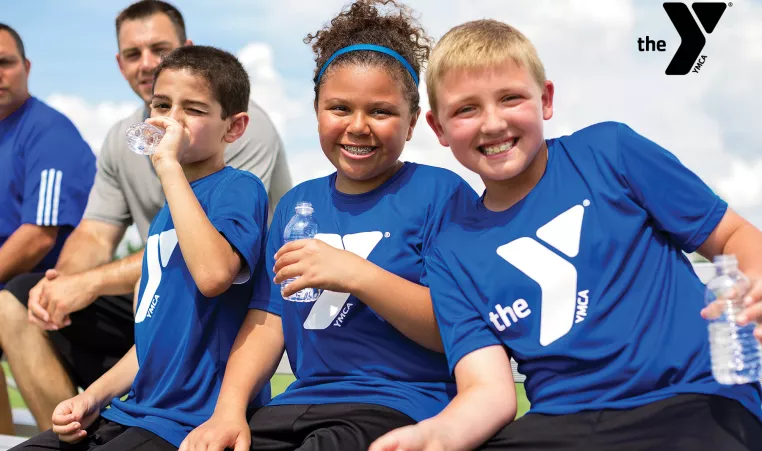
Positivity is a Fundamental of Youth Sports – Developing the Complete Child
Picture a Saturday morning, at the basketball court, watching a group of three and four year olds trying to dribble a basketball for the first time. Moms and dads are standing next to them saying, “Like this, like this.” Next the group rotates closer to the hoop, which has been brought down to an achievable height. The child, staring at that net, holding that ball about ready to release when…they let go of the ball, it hits the rim, circles around and falls all the way through. With excitement, the child runs over to mom and dad shouting, “I made it, I made it!.” Mom and dad, congratulatory, “Good Job! Go do it again”. The child rushes back. As we go throughout the year, we come to late fall we find our little star, now a little older and on their second season of basketball. Each game, dribbling more, making more baskets, making new friends, hitting new milestones!
As we continue to monitor the child off the court, we notice the child making friends easily at daycare, perhaps through ways of playing or sharing, engaging positively with other kids, maybe showing other kids something they learned over the weekend. We ask ourselves, are these connected? The answer is yes! Children who are actively participating in youth sports and other activities where they are experiencing a positive outcome are making strides towards necessary developmental milestones not only on the court, but in every day situations by implying those learned skills and positive affirmations.
Let’s take our little star for example. A child beginning youth sports at three or four years old, learning the fundamentals of multiple sports, developing their skills on the court; coordination, ball handling, basic game play. Learning how to interact with other children, teamwork, sharing, communication, listening to directions. They continue, five and six years old now, dribbling more, coordination with hoop height and making the basket increasing, ball control continuing as they learn about the importance of continuing to dribble and about double dribbles. As our little star enters the seven- and eight-year-old age division, our game play is getting more competitive. Double dribbles are being called, we are learning about fouls and are practicing more drills and screens to prepare them each week for the next game. As our little star approaches eight to nine years old, they appear to have been taking a liking to basketball. As a parent or care giver, how to set them up for future success? Do you stay with fundamentals, do you put them on a competitive team, what are their thoughts, what do they want to do? It is always important to include the child when making those decisions. Be sure to know the differences between multiple programs and know what the focus of each program is. Fundamental programs focus on developing the skills along with the child and trying their best to offer fair play rules, allowing every child to play; where competitive programs focus on competition, and some children will not receive as much actual play time as others.
When a child actively participates in a fundamental sport session, what seems to appear to an adult as too simple, to a child is more complex. That child is not only learning about the sport, or how to play the sport, but is also learning important social skills and teamwork, along with learning about winning and losing in a nonthreatening environment. When kids come together learning fundamentals and basics, everyone wins. It is important in all circumstances, regardless of the “score” outcome, to positively reinforce what went well, what the child did right, before pointing out what they could have done differently. Lifting those positive items, gives that child a sense of success, the sense of doing something right, making mom and dad or their caregiver feel proud of them. When jumping straight to the negatives, a child may feel upset, have a feeling that they did something wrong, maybe a feeling of disappointing mom and dad or their caregiver, leading to the child not wanting to continue or go back and try again.
Let’s picture, a Saturday morning, five- and six-year old’s just finishing their warmup practice and getting ready to play the other team. The children, the team, and the coach are on their bench, getting ready for the game. The coach is telling the children they are all great, and not to worry about what happens, just play your best. They play, they win, afterwards the coach tells them all how great they did, he gives them high-fives, parents and caregivers come over, full of hugs and “good jobs”. The kids are excited, they have an energy, they can’t wait to play again.
Next, let’s picture the same team, sitting on the bench with their coach getting ready for the game. The coach is telling the children they are all great, and not to worry about what happens, just play your best. They play, this time, they don’t win the final score, but they win something even greater, positive reaffirmation of a game well played. Afterwards, the coach tells them how they all played their hardest, he gives them high-fives, he tells them what they will do next time, keeping them excited. Mom, dads and caregivers are supportive, uplifting and praising the kids for their hard work. The kids come back excited the next week.
Lastly, we picture the same team, sitting on the bench with their coach getting ready for the game. This time, coach is determined to win every game. They are telling their players to go out there, be tough, play hard, remember what was learned at practice, demonstrate your skills. At the end of the game, despite a possible scoring win, the coach has the team back on the bench, only this time, jumping to “why didn’t you do this, was anyone listening, why were we on the court”, instead of telling the team what they did well. The team all puts their heads down, they take it. Mom, dad, caregivers come after the game, silence, as they exit the gym and walk to the car. Next week, one child does not come back.
When positivity is removed from the fundamentals of the game, it ultimately breaks down the child and removes the fun of the sport, turning the child away, possibly taking away any future potential a child may have had, and making it difficult for the child to return. Negative affirmations given while learning fundamentals, takes the fun of the sport away, creating a negative experience, giving a child a sense that they are not able to do it or not good enough.
When positive affirmations are used regularly during fundamental activities, it helps the child develop a sense of mastering the skill or task at hand. When we look at a simple skill of shooting the ball into the basket, and we have the child who is hitting the rim, but just coming up short, we encourage them to keep trying. We give tell them “good job, next time try…” Giving those tips to help with the fundamental skill and keeping the coaching cues positive not only develops the skill, but also develops the child giving them a sense that they are able to do it. Pushing them towards mastering the skill.
As adults, parents, caregivers, coaches, mentors, etc., one thing is always certain. Children absorb and learn what they are around in various situations. If we all do the best that we can to make their experience a positive one, we are fulfilling in helping to develop the complete child.
Alexis U., Mills County YMCA Senior Program Director (Aquatics & Youth Sports)
